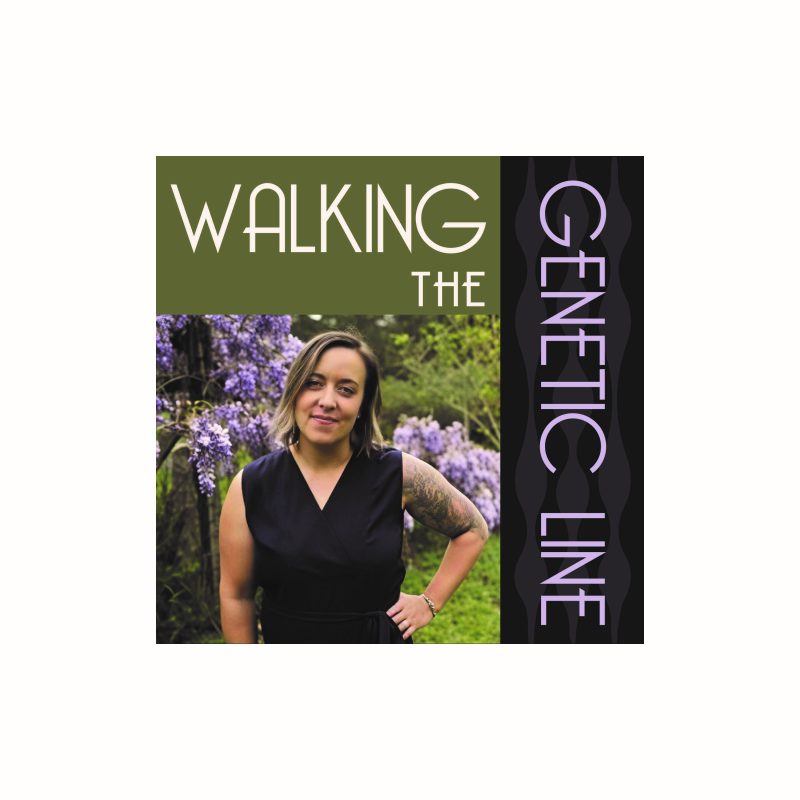PUBLISHED: 31st October 2025

by Sara Champie, LCSW
Learning I carry a BRCA1 mutation ushered me into a world defined by medical appointments, probabilities and prevention plans. But what struck me most wasn’t the science; it was how alone I often felt trying to make sense of it all. I didn’t feel like a statistic. I felt like an overwhelmed human being. I longed for conversations that reflected the depth, emotion and complexity of what this experience really means.
That longing eventually inspired me to establish Walking the Genetic Line, a podcast about the emotional and relational layers of living with hereditary cancer risk—whether that means navigating genetic testing as a preventive step or as part of cancer treatment. Each episode explores what it means to live with uncertainty, loss, identity changes and resilience when our DNA carries a story that continues to unfold.
Between the scans
The podcast features people from all over the world who are walking this line in their own ways—those living with cancer, survivors, previvors, caregivers, genetic counselors and clinicians. Together, we explore what happens between the scans: the quiet moments of reckoning, the relational ruptures and repairs, and the courage it takes to keep engaging with life while living with risk.
In these conversations. I bring my perspective as both a trauma-informed psychotherapist and a BRCA1 carrier. My clinical work has shown me how much our histories—medical trauma, family loss or uncertainty—shape how we experience genetic testing, treatment decisions and survivorship. And as someone living this journey myself, I understand that these experiences are not purely medical; they are emotional, relational and profoundly human.
How FORCE impacted my journey
Throughout my own process of learning, grieving and deciding, FORCE has been a steady and trustworthy companion. I have read every newsletter and resource I could find—each one helping me translate complex information into choices that felt aligned with my life and values. I’m especially grateful for FORCE’s clear educational materials on prophylactic surgery options and their dedicated attention to the experiences of transgender and gender-diverse people in this space. Their commitment to inclusive, evidence-based and compassionate education has directly impacted how I approach my work and my own medical decisions.
FORCE reminded me that while we may carry different mutations or diagnoses, we share a community grounded in courage and care. That sense of belonging is part of what inspired me to start Walking the Genetic Line—to add more voices and emotional depth to the collective story FORCE has helped bring forward.
A Trauma-informed lens
In trauma-informed care, we understand that our past shapes how we respond to the present. For someone with a history of illness or loss, genetic testing can stir old memories or fears. Even when the information we receive is intended to empower us, it can also feel overwhelming or destabilizing. The nervous system may react long before the mind catches up, leaving us re-enacting old traumatic patterns of isolation, fear of vulnerability, shame and self-punishment.
In the podcast, I bring my training to the conversation and weave in ideas from interpersonal neurobiology, depth psychology, and relational trauma theory—not to make the conversations academic, but to offer language for what so many of us already feel. Understanding our reactions helps transform self-blame into self-understanding. It’s one way we reclaim agency in the face of uncertainty.
Inviting you into the conversation
Walking the Genetic Line isn’t just my project—it’s a collective effort to bring visibility, nuance and healing to the hereditary cancer community. I’m currently seeking guests who are open to sharing their lived experience or professional perspective. Your story matters, whether you’ve received genetic testing as part of treatment or you’re living with cancer, you’re a previvor or part of a family navigating hereditary risk. These conversations help others feel less isolated and remind us that the path through diagnosis, treatment and risk is one we walk together.
Together, we’re expanding what it means to face our risk—bringing both science and story, mind and body, data and depth—into one compassionate conversation.
Sara Champie, LCSW is a trauma-informed therapist providing psychotherapy services for individuals and families navigating hereditary cancer risk and survivorship. Listen to Walking the Genetic Line wherever you get your podcasts. Visit www.facetherisktogether.com or contact Sara on Instagram (@facetherisktogether) to learn more.
POSTED IN: Books And Movies , Emotional Health And Well Being
TAGS: BRCA1 , Mental Health , Coping With Risk